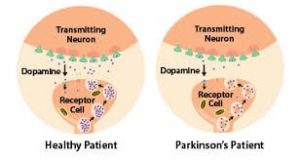Parkinson’s disease is a neurological condition, that over time causes the person who has it to develop worse symptoms, which is known as a progressive neurological condition. It is a disease that starts to develop when some of the cells in the brain stop working correctly – these are the cells that produce the chemical dopamine.
Dopamine is an important chemical in the brain – it is a neurotransmitter which means it passes messages between nerves, allowing them to communicate and control movement, as well as having a huge role to play in how we feel. Dopamine helps us to focus, to plan and to engage in the things that interest us.

People who have Parkinson’s first notice symptoms of not being able to control their movements properly any longer. This can be seen in a variety of ways – some people may tremble or shake, some may have very rigid muscles in places, or some may move very slowly.
There is a lot of research being done into Parkinson’s disease with the goal of finding a cure – things like adaptive phase 1 clinical studies are part of the ways that new drugs can be trialled to help those suffering from the disease.

Not all people who have the disease will experience the same symptoms, and there are already some medicines that can help to alleviate some of the symptoms of the disease. It is not something that directly causes death, but some of the symptoms of the disease can increase the risk of death – for example it can make someone more likely to have a fall if they don’t have control of their muscles.
















+ There are no comments
Add yours